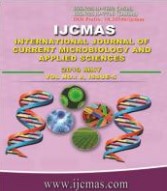


 National Academy of Agricultural Sciences (NAAS)
National Academy of Agricultural Sciences (NAAS)

|
PRINT ISSN : 2319-7692
Online ISSN : 2319-7706 Issues : 12 per year Publisher : Excellent Publishers Email : editorijcmas@gmail.com / submit@ijcmas.com Editor-in-chief: Dr.M.Prakash Index Copernicus ICV 2018: 95.39 NAAS RATING 2020: 5.38 |
SWOC analysis is a strategic planning method used to research external and internal factors which affect company success and growth. Firms use SWOC analysis to determine the Strengths, Weaknesses, Opportunities and Challenges of the firm, products and competition. A study was conducted to investigate the prospects of organic paddy farming in Cauvery Delta Zone of Tamil Nadu for SWOC analysis on organic paddy farming. 180 organic paddy farmers were selected by proportionate random sampling technique. Majority of the organic paddy framers perceived and ranked low cost of production (I rank), sustainability (II rank) and use of indigenous technologies (III rank) were strengths. Weaknesses include inadequate technology, lower yield and less awareness were first, second and third rank respectively. Opportunities perceived by majority of organic paddy farmers were growing environmental concern (I rank), growing health awareness (II rank) and increasing market demand (III rank). Costly and complex organic certification process (I rank), weed problems (II rank) and most of the fields are contiguous and problem of contamination (III rank) were the challenges as perceived by organic paddy farmers. Based on the result of SWOC, strategies were suggested for the development of organic paddy farming in research extension, production, processing and marketing sectors.
 |
 |
 |
 |
 |